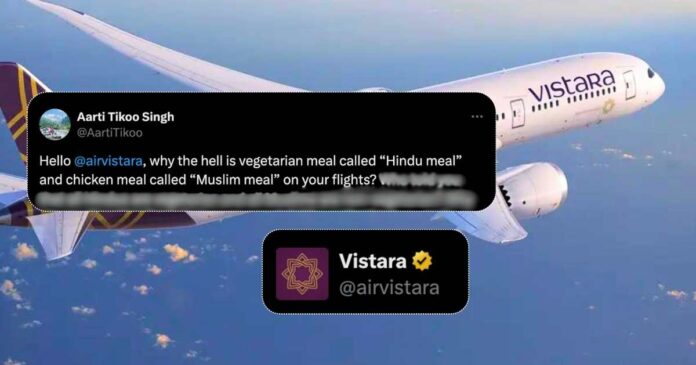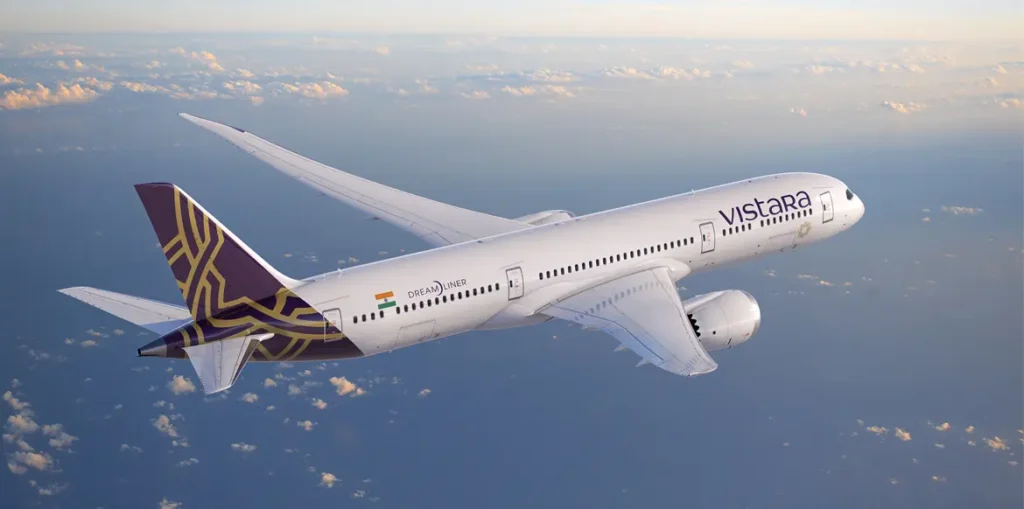
Recently, Vistara Airlines came under fire from an X user for designating its on-board meals as “Hindu” (vegetarian) and “Muslim” (chicken). Aarti Tikoo Singh voiced her concerns on X, alleging that the airline was promoting prejudices and associating religious identities with dietary choices.
She asked if Vistara was trying to link food and passengers with religion and joked that they should separate passengers and veggies according to faith.

She wrote,
“Hello @airvistara, why is a vegetarian meal called a ‘Hindu meal’ and a chicken meal called a ‘Muslim meal’ on your flights? Who told you that all Hindus are vegetarian and all Muslims are non-vegetarian? Why are you imposing food choices on people? Who authorized you to do this? Are you going to communalize vegetables, chicken, and passengers too? I was so shocked by this behavior that I booked both meals to defy your categorization,” while sharing a screenshot of her ticket displaying one “Hindu meal” and one “Moslem meal.”
Her post received a lot of comments and became viral very fast. Some readers agreed with her viewpoint and asked Vistara to provide an explanation for the food labels labelled “Hindu” and “Muslim.” Others gave background information, stating that these meal codes are standard throughout the airline industry and are not exclusive to Vistara.
In order to ensure consistency and efficiency in handling passenger meal requests, social media users clarified that the International Air Transport Association (IATA) sets these standardised meal codes. These codes are then used industry-wide to streamline meal management and communication among airlines, caterers, and ground staff.
Hello @airvistara, why the hell is vegetarian meal called “Hindu meal” and chicken meal called “Muslim meal” on your flights? Who told you that all Hindus are vegetarian and all Muslims are non-vegetarian? Why are you thrusting food choices on people? Who authorised you to do… pic.twitter.com/46w4avU7Vs
— Aarti Tikoo Singh (@AartiTikoo) August 27, 2024
One user noted, “Are you travelling after a long time? This classification is not new; international flights have had it too. Instead of writing halal, they use ‘Muslim meal,’ and similarly, ‘Hindu veg meal’ might include onion and garlic, whereas a ‘Jain veg meal’ would not.”
Sanjay Lazar, CEO of Avialaz Consultants, further explained, “In aviation terminology, a Hindu Meal (HNML) is not necessarily vegetarian; it could be a non-veg meal that is not halal. Similarly, a Moslem Meal (MOML) is a halal non-vegetarian meal.”
Madam it’s always good to check first !
— Sanjay Lazar (@sjlazars) August 27, 2024
FYI in general aviation parlance, a Hindu Meal (HNML) is NOT necessarily a Veg meal – it could be a Non Veg meal that is not Halal.
Similarly a Moslem meal (MOML) is a Non Vegetarian meal that is HALAL.
A Vegetarian meal, on the other… pic.twitter.com/kCfHzykliy
Former CEO-designate of Jet Airways and seasoned aviation expert Sanjiv Kapoor also offered his thoughts on the matter, saying, “These are standard international meal codes used globally across GDS-based airlines, not just by Vistara.” But IATA, or whoever is in charge, ought to think about modernising and upgrading these antiquated, occasionally confusing meal codes.
These are standard international meal codes used globally across GDS-based airlines, not just by Vistara. However I do think IATA or whoever needs to update / modernize these outdated and at times somewhat puzzling meal codes. https://t.co/QLO9BlutZB
— Sanjiv Kapoor (@TheSanjivKapoor) August 27, 2024
